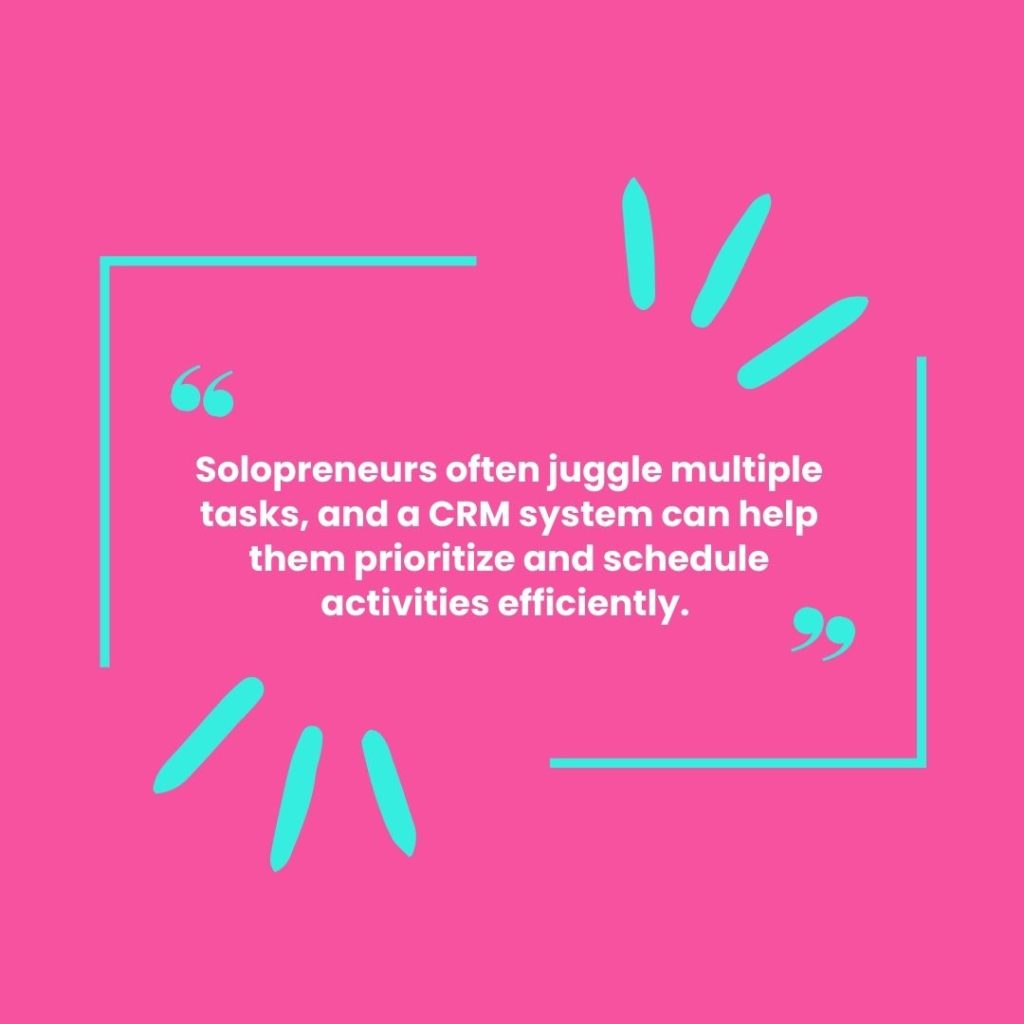In the contemporary business landscape, entrepreneurship has evolved beyond the traditional corporate structure, giving rise to the concept of solopreneurship. Solopreneurs, also known as solo entrepreneurs, are self-reliant individuals who operate and manage their businesses alone. They handle various aspects of their enterprise, from marketing and sales to finance and customer service, with minimal or no assistance from employees. In this article, we will delve into the definition of solopreneurs, explore the role of freelancers in the business world, and highlight the differences between the two. Additionally, we will discuss the significance of Customer Relationship Management (CRM) systems in empowering solopreneurs to thrive in their ventures.
Understanding Solopreneurs
A solopreneur is an individual who establishes and runs a business single-handedly, making them both the founder and the primary workforce of their enterprise. Solopreneurs may operate in various industries, offering services, products, or a combination of both. They enjoy full autonomy and decision-making power over their business, allowing them to pursue their passion and maintain control over their entrepreneurial journey. Solopreneurs may choose this path for various reasons, such as flexibility, creative freedom, and the desire to be their own boss.
Differentiating Freelancers from Solopreneurs
While solopreneurs and freelancers both operate independently, they differ in their business models and approach.
2.1 Freelancers:
Freelancers are self-employed individuals who offer their specialized skills and services to clients on a project-by-project basis. They often work on short-term assignments or contracts, serving various clients simultaneously. Freelancers may be part of a larger team or collaborate with other freelancers to complete complex projects. They usually charge clients based on an hourly or project-based rate and may have a fluctuating workload depending on their client base.
Also Read: The Power of AI-Generated Content in Digital Marketing
2.2 Solopreneurs:
Solopreneurs, on the other hand, focus on building and growing their own business brand rather than offering services exclusively to clients. They are the sole driving force behind their venture, responsible for all business operations, marketing strategies, customer interactions, and financial decisions. Solopreneurs generally have a long-term vision for their business and aim to expand their enterprise over time. They may hire contractors or outsource certain tasks but do not operate in the same project-based manner as freelancers.
The Importance of CRM for Solopreneurs
As a solopreneur, managing multiple aspects of a business single-handedly can be challenging. Customer Relationship Management (CRM) systems come to the rescue by providing a comprehensive solution to streamline and automate essential business processes. Here are some reasons why CRM is crucial for solopreneurs:
3.1 Centralized Customer Data Management:
CRM platforms allow solopreneurs to store and access vital customer information in one centralized location. This includes contact details, purchase history, interactions, and preferences. Having a 360-degree view of customers enables personalized communication and targeted marketing efforts.
Also Read: Threads by Meta Bridging the Gap Between Instagram and Twitter
3.2 Efficient Task Management:
Solopreneurs often juggle multiple tasks, and a CRM system can help them prioritize and schedule activities efficiently. Reminders, calendars, and task tracking features enable better time management and improved productivity.
3.3 Customer Communication:
Effective communication is the key to building strong customer relationships. CRM tools offer various communication channels, such as email templates and automated responses, to engage with customers consistently and promptly.
3.4 Sales and Marketing Automation:
CRM for solopreneurs automates repetitive sales and marketing tasks, such as lead nurturing, email campaigns, and follow-ups. This automation saves time and ensures that no potential leads slip through the cracks.
3.5 Data Analytics and Reporting:
CRM systems provide valuable insights through data analytics and reporting. Solopreneurs can analyze customer trends, track sales performance, and make data-driven decisions to enhance their bus iness strategy.
The Best CRM for Solopreneurs and Small Businesses in 2023
In the ever-evolving world of freelancing and solopreneurship, having an efficient and feature-rich CRM is essential to manage leads, clients, projects, and business operations effectively. RisePath has emerged as the top choice among CRMs for freelancers and solopreneurs, providing a comprehensive suite of tools to nurture leads, streamline client communication, and enhance project management. Let’s explore why RisePath stands out as the best CRM for solo operators and small businesses.
Comprehensive Features and Affordable Pricing
RisePath offers an impressive array of features tailored to the needs of solopreneurs and small businesses, making it a versatile and powerful tool. From sales pipeline management to time tracking, invoicing, billing, and project milestone monitoring, RisePath provides everything freelancers need to run their businesses smoothly. What’s even better is that RisePath offers competitive pricing, including a free starting plan, allowing solopreneurs to get started without breaking the bank.
Intuitive Client Communication
Effective client communication is vital for any freelancer or solopreneur. RisePath excels in this aspect, providing intuitive tools that enable seamless communication with leads and clients. The platform offers email integration, customizable quotes, and even a Facebook Messenger integration to streamline communication channels and enhance client interactions.
Outstanding User Support
For freelancers and solopreneurs, having reliable user support is crucial. RisePath understands this and offers exceptional customer service to assist users in navigating the platform and resolving any issues that may arise. Whether you have a technical question or need guidance on optimizing your CRM setup, RisePath’s support team is there to help.
Invoicing and Billing Made Easy
One of the standout features of RisePath is its robust invoicing and billing capabilities. Solopreneurs can generate professional-looking invoices, track payment status, and manage billing seamlessly within the platform. This not only saves time but also ensures that freelancers get paid promptly for their hard work.
Native Integrations with Third-Party Tools
RisePath’s seamless integration with popular third-party tools enhances its functionality even further. Whether it’s integrating with your email client, project management software, or accounting platform, RisePath makes it easy to sync data and streamline your workflow.
Effortless Project Management
Freelancers often juggle multiple projects, and RisePath understands the importance of effective project management. The platform offers intuitive project tracking features, allowing solopreneurs to monitor project milestones, deadlines, and deliverables, ensuring projects stay on track.
RisePath best CRMs for Freelancers & Solopreneurs
In 2023, RisePath has firmly established itself as the top CRM for solopreneurs and small businesses in the freelancing world. Its comprehensive features, affordable pricing, and outstanding user support make it a standout choice for freelancers looking to enhance their sales, marketing, and project management processes. RisePath empowers solopreneurs to focus on what they do best while providing the tools they need to succeed in their entrepreneurial journey. If you are a freelancer or a solopreneur seeking the best CRM to optimize your business, RisePath should be at the top of your list.
Conclusion
Solopreneurs represent a unique breed of entrepreneurs who thrive in the competitive business world while managing all aspects of their venture individually. Embracing technology, such as CRM systems, can significantly impact the success of their businesses by optimizing customer relationships, streamlining operations, and increasing efficiency. By leveraging CRM tools tailored to their specific needs, solopreneurs can focus on their passion, deliver exceptional customer experiences, and ultimately achieve long-term success in their entrepreneurial journey.




Comments are closed, but trackbacks and pingbacks are open.